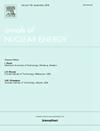具有非均匀系数的中子扩散方程的混合对偶形式的物理信息神经网络
IF 1.9
3区 工程技术
Q1 NUCLEAR SCIENCE & TECHNOLOGY
引用次数: 0
摘要
物理信息神经网络(pinn)是一种流行的用于偏微分方程(PDEs)数值逼近的深度学习框架,在这项工作中研究了用于核反应堆堆芯模拟的中子扩散方程的近似解。此外,由于非均质系数的存在,该方程可能具有较低的正则解,这对基于中子扩散方程原始形式的PINNs方法提出了挑战。在这项工作中,我们研究了中子扩散方程混合对偶形式的pinn方法,目的是证明与原始方法相比,它可以显着提高近似解的精度,特别是在具有非均匀系数的情况下。此外,神经网络通常基于k特征值问题的逆幂方法,众所周知,如果优势比很高,该算法收敛速度很慢,这在一些反应堆物理应用中很常见。因此,我们也讨论了用于k特征值问题的pinn方法的一些加速方法。源和k特征值问题的几个数值测试用例说明了我们的目的。本文章由计算机程序翻译,如有差异,请以英文原文为准。

Physics Informed Neural Networks for the mixed dual form of the neutron diffusion equation with heterogeneous coefficients
Physics-Informed Neural Networks (PINNs), a popular deep learning framework for numerical approximations of Partial Differential Equations (PDEs), are investigated in this work to approximate the solution of the neutron diffusion equation, which is used in simulations of nuclear reactor cores. Moreover, this equation may have low regularity solution due to heterogeneous coefficients, which presents a challenge for the PINNs approach based on the primal form of the neutron diffusion equation. In this work, we study the PINNs approach for the mixed dual form of the neutron diffusion equation and aim to demonstrate that it can significantly improve the accuracy of the approximate solution, especially in cases with heterogeneous coefficients, compared to the primal approach. Besides, neural networks are typically based on the inverse power method for the k-eigenvalue problem, and it is well-known that this algorithm converges very slowly if the dominance ratio is high, as is commonly the case in several reactor physics applications. Therefore, we also discuss some acceleration methods for the PINNs approach applied to the k-eigenvalue problem. Several numerical test cases for the source and k-eigenvalue problems illustrate our purposes.
求助全文
通过发布文献求助,成功后即可免费获取论文全文。
去求助
来源期刊

Annals of Nuclear Energy
工程技术-核科学技术
CiteScore
4.30
自引率
21.10%
发文量
632
审稿时长
7.3 months
期刊介绍:
Annals of Nuclear Energy provides an international medium for the communication of original research, ideas and developments in all areas of the field of nuclear energy science and technology. Its scope embraces nuclear fuel reserves, fuel cycles and cost, materials, processing, system and component technology (fission only), design and optimization, direct conversion of nuclear energy sources, environmental control, reactor physics, heat transfer and fluid dynamics, structural analysis, fuel management, future developments, nuclear fuel and safety, nuclear aerosol, neutron physics, computer technology (both software and hardware), risk assessment, radioactive waste disposal and reactor thermal hydraulics. Papers submitted to Annals need to demonstrate a clear link to nuclear power generation/nuclear engineering. Papers which deal with pure nuclear physics, pure health physics, imaging, or attenuation and shielding properties of concretes and various geological materials are not within the scope of the journal. Also, papers that deal with policy or economics are not within the scope of the journal.
 求助内容:
求助内容: 应助结果提醒方式:
应助结果提醒方式:


